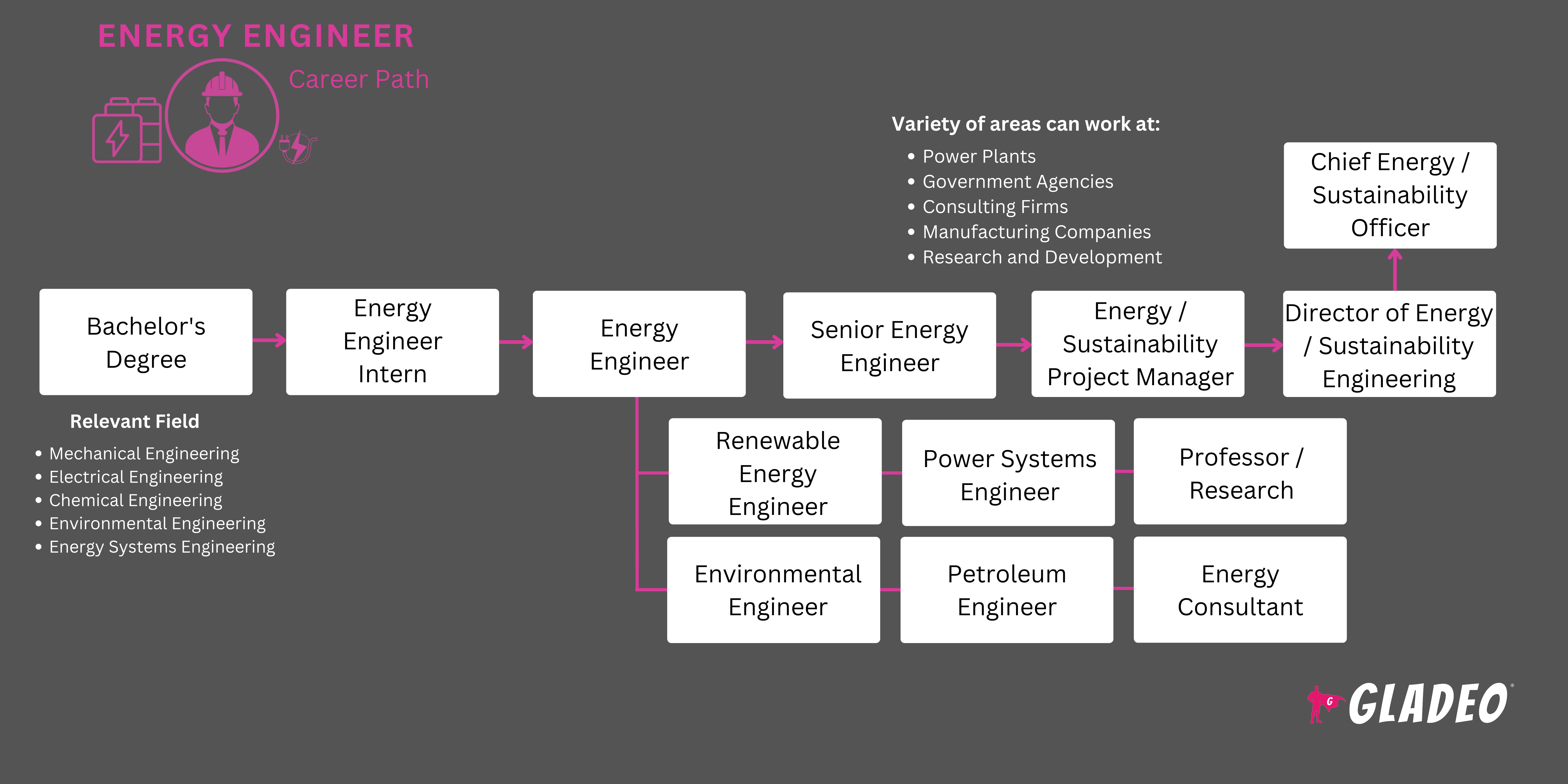聚光灯
能源效率工程师、能源工程师、工业能源工程师、测量与验证工程师、测试与平衡工程师
工程学被视为现代社会的支柱。简而言之,它就是"运用数学和科学原理进行机器、结构和工艺的设计、测试与建造"。
除了化学工程、土木工程、电气工程和机械工程等主要工程分支外,工程领域还包含数百个子类别。其中最令人振奋的新兴领域之一便是能源工程!
在可再生能源与可持续实践日益受到重视的时代,能源工程师已成为不可或缺的角色。他们专注于开发能源相关项目与系统,致力于提升能源利用效率并降低环境影响。
他们的职责包括开展能源审计、设计可再生能源系统(如太阳能和风能),并提出改进现有系统的方案。能源工程师在研究和实施新技术方面发挥着关键作用,以满足全球对更可持续能源解决方案日益增长的需求。
- 从事从太阳能农场到节能建筑的多元化项目
- 创新可再生能源技术
- 为环境可持续性和节能事业作出贡献
- 在应对气候变化和减少碳足迹方面发挥作用
工作日程
- 能源工程师需全职工作,紧急情况下可能需要加班。可能需要在本地区内出差。
典型职责
- 评估并优化不同条件和设置下的能源使用
- 计算升级设备和系统后预计的潜在节能效果
- 进行温度测试和法规合规性评估
- 确保设计和产品安装符合安全及能效标准
- 组织基准成本与消耗
- 设计并实施可再生能源系统
- 使用软件创建详细的施工图纸集和模型
- 在开发活动中提供协助,确保各项行动按时完成
- 构建符合相关标准的性能模型
- 分析燃气炉和锅炉的排放与性能
- 实现商用供暖、通风和空调(HVAC)系统中设备故障检测与能耗分析的自动化
- 与工程师、建筑师及其他专业人士协作推进项目执行
- 促进系统原型提交与实验
- 评估系统与现有基础设施的集成情况
- 审查分包的能源评估和改造调试项目,以确保质量。
- 估算能源和水费节约量,满足全公司投资回报率要求
- 创建报告以比较预计节能量与实际节能量
额外职责
- 及时了解法规与环境立法的最新动态
- 研究新能源技术,以保持在该领域的领先地位
- 参加社区和商业伙伴的可持续发展会议
- 鼓励对节能和太阳能技术进行投资
软技能
技术技能
- 建筑信息模型
- 计算机辅助设计(CAD)工具,例如Autodesk AutoCAD、SolidWorks、Revit等。
- 开发环境工具如LabVIEW和Verilog
- 能源分析与管理工具,例如EnergyPlus、RETScreen或HOMER
- 地理信息系统
- 能源系统与可再生能源技术知识
- 制造与加工知识
- 机械天赋
- 操作系统软件,如Linux、Windows、Shell脚本、UNIX
作业分析 - 诸如C++、Python等编程语言
- 项目管理软件,如Microsoft Project或Primavera
- 科学软件,例如Powersim和MathWorks
- 仿真与建模软件,如ANSYS、MATLAB或Simulink
- 在STEM所有领域都具备扎实的技能
- 建筑与建筑服务
- 工程咨询公司
- 环境机构
- 政府和公共机构
- 制造业和工业企业
- 可再生能源企业
- 研究机构,包括学院
- 公用事业公司
能源工程师必须不断更新技能以适应技术和法规的演变,且常需在紧迫期限内完成工作。这种终身学习的承诺至关重要,但往往意味着延长工作时间——尤其在处理大型项目或应对紧急能源危机时。
工作可能需要他们长期驻守偏远地区,影响个人生活。有时他们会遭遇行业阻力或公众质疑,这要求他们不仅要具备精湛的工程技术,还需成为高效的沟通者。毕竟,能源工程师必须成为可持续能源实践与政策的坚定倡导者!
当前趋势强调可再生能源与智能技术的融合。从化石燃料向太阳能、风能等可再生能源的转变,是由环境问题和技术进步共同推动的。
能源工程师专注于效率、可扩展性和经济可行性。此外,提升电池系统等能源存储技术至关重要,因为可再生能源的产出受环境条件制约。例如,太阳能发电量随日照强度波动,因此能够储存捕获的能量显得尤为重要。
智能技术,尤其是物联网技术,正被整合到能源系统中,例如智能电网,这些系统能提升电力分配的效率和可靠性。与此同时,人工智能和机器学习正助力预测能源消耗模式并优化能源使用。
能源工程师在年少时可能就对STEM学科展现出浓厚兴趣。许多人热衷于机械或电气项目的搭建与实验,例如构建简单电路和模型,或参与科学展览会。他们对事物运作原理的早期痴迷,加上对环境问题的关注,很可能将他们引向了这一职业领域!
- 能源工程师需持有经ABET认证的能源工程、机械工程或相关领域的学士学位。
- 许多学生选择攻读双学位(学士/硕士),这既能节省时间又能节约费用。
- 高级学位对专业岗位或研究职位可能具有优势。
- 常见课程可能包括:
- 能源管理
- 能源政策
- 核能
- 可再生能源系统
- 热力学
- 学生可选择专注于以下专业领域(包括但不限于):
- 能源效率
- 能源政策
- 能源系统
- 核能
- 可再生能源
- 智能电网与能源存储
- 寻找提供能源工程、机械工程或相关专业且获得ABET认证的院校。
- 寻找提供实习机会的项目
- 项目应获得ABET认证,这是后续获取专业工程师执照的必要条件。
- 奖学金与STEM升学通道!你心仪的院校在改善入学渠道方面投入了多少心力,以助你顺利进入他们的项目?
- 请关注该项目的教师奖项与成就。其卓越荣誉包括:教学奖项、IEEE及 美国国家科学基金会奖项与表彰、富布赖特学者奖学金、最佳论文奖以及杰出讲师称号。
- 查看他们的设施(特别是如果你计划亲自到场)。资金充足的项目将拥有最现代化、最尖端的研究区域。
- 寻找附属中心和研究所。大多数大型项目都与外部合作伙伴开展合作,这能显著提升你的学习体验。
- 务必关注学校为毕业生提供的资源!他们是否公布就业率数据?校友网络是否提供有益的职业指导和人脉拓展?
- 请考虑学费、折扣以及本地奖学金机会(除联邦援助外)的费用。
- 在决定是否报名参加校内课程、在线课程或混合课程时,请考虑您的日程安排和时间灵活性。
- 在高中阶段提前修读大学预科课程(如数学、物理和环境科学)大有裨益。扎实的英语和技术写作能力也将在未来带来回报。
- 若开设相关课程,建议选修蓝图绘制、计算机编程、计算机辅助设计及电子学等选修课。
- 在选课前,尽可能多地了解该职业领域。明确自己的专业方向,并仔细阅读招聘网站上发布的职位描述。
- 更进一步,列出你梦想效力的机构名单,不妨联系现任员工,向他们请教经验。
- 通过实习或相关学徒计划获得实践经验
- 别忽视软技能。工程师也该是“善于与人打交道的人”!
- 自愿参与学校委员会工作或协助课外活动,重点选择能提供领导力和管理经验的岗位。
- 浏览我们推荐的网站列表,寻找专业团体加入。同时,积极参与学校的工程与环境俱乐部及相关活动。
- 请一位经验丰富的能源工程师,看他们能否抽出时间指导你,作为回报,你可以协助他们完成某些工作。
- 培养计算机编程和能源建模相关软件的技能。
- 阅读在线文章和行业刊物,例如《能源工程》
- 熟悉当前全球能源发展趋势。参与相关在线论坛和讨论组。
- 记录所有工作和学术成就,用于简历和大学申请。

- 根据PayScale的数据,高达85%的工作机会是通过人脉网络获得的——所以赶快在领英等社交平台创建个人资料吧!
- 在Indeed、SimplyHired、Monster、USAJobs、ZipRecruiter、Velvet Jobs和Glassdoor等求职网站上注册接收职位通知。
- 浏览招聘广告,寻找可列入简历的关键词,例如:
- 可再生能源、能源效率、工程软件、仿真与建模、项目管理、数据分析、技术技能、法规合规、系统优化、可持续发展、能源审计、电网管理、可再生能源技术、软件熟练度、研发、能源政策、环境影响评估、储能技术、沟通能力、团队领导力、AutoCAD、MATLAB、ANSYS、HOMER、EnergyPlus、 敏捷开发、Scrum、精益管理、统计分析、数据建模
- 要取得进步,你必须确立目标,设定里程碑,并制定实现每个里程碑的计划。
- 确定你希望在5年、10年或20年后达到的位置,然后规划你的计划。你想管理他人并领导团队吗?你想成为管理者吗?销售领域呢?明确目标将帮助你相应调整教育和培训方向。
- 雇主很可能会投入时间和金钱培养你,并希望留住你,因此请明确表示你有意在公司内部争取晋升机会。
- 与您的主管讨论晋升事宜。获取建议并探讨各种选择。能源工程领域蕴藏着无限可能!
- 大多数中小型企业晋升机会有限,求职时请务必留意这一点。要攀登任何阶梯,阶梯上必须有空着的横档。
- 尽快取得体育教师资格证,以此展现您追求卓越的决心以及承担更多职责的意愿。
- 在具备相应资质时,可额外考取其他证书,例如美国公共电力协会的能源效率管理证书、能源与环境设计先锋(LEED)认证专家资格,或能源工程师协会的认证证书。
- 努力在各类能源项目中积累多元化的经验
- 考虑专注于一个正在增长的细分领域,例如太阳能或可持续建筑设计。
- 积极主动地进行职业发展并参加继续教育课程
- 积极参与专业组织(更多信息请参阅我们的推荐资源列表)
- 及时了解法规变化,确保贵组织始终合规。
网站
- 工程与技术认证委员会
- 美国环境工程师与科学家学会
- 美国钻井工程师协会
- 美国石油地质学家协会
- 美国化学工程师学会
- 美国采矿、冶金与石油工程师学会
- 美国国家标准学会
- 美国石油学会
- 美国公共电力协会
- 美国工程教育学会
- 美国土木工程师学会
- 美国机械工程师学会
- 能源工程师协会
- 工业工程委员会
- 无国界工程师
- 美国地质学会
- 美国独立石油协会
- 电气与电子工程师学会
- 工业与系统工程师学会
- 英国化学工程师学会
- 土木工程师学会
- 工程与技术学会
- 英国机械工程师学会
- 国际钻井承包商协会
- 国际自动化学会
- 能源与环境设计先锋(LEED)
- 国家工程与测量考试委员会
- 美国国家专业工程师协会
- 可再生能源世界
- 科技学生协会
- 美国能源信息署
书籍
- 《储能基础:能源从业者学习指南》,肖恩·怀特与萨阿德·优素菲著
- 《可再生能源工程》作者:尼古拉斯·詹金斯与贾纳卡·埃卡纳亚克
- 风能工程:陆上与海上风力涡轮机手册,作者:特雷弗·莱彻
能源工程是一个至关重要且不断发展的职业领域,但目前其岗位空缺数量相较于其他工程领域并不算多。这种状况在未来几年可能会发生显著变化。
与此同时,其他类型的工程师也为能源工程领域做出了贡献——因此,若您有兴趣探索相关职业,不妨参考以下建议。
- 航空航天工程师
- 化学工程师
- 土木工程师
- 计算机硬件工程师
- 电气与电子工程师
- 环境工程师
- 地热生产经理
- 工业工程师
- 制造工程师
- 材料工程师
- 机械工程师
- 采矿与地质工程师
- 水/污水处理工程师
新闻源

精选职位

在线课程与工具

年薪预期
新员工起薪约为9.7万美元。年薪中位数为11万美元。经验丰富的员工年薪可达13.5万美元左右。
年薪预期
新员工起薪约为11.9万美元。年薪中位数为15.5万美元。经验丰富的员工年薪可达18万美元左右。
年薪预期
新员工起薪约为10.8万美元。年薪中位数为13.7万美元。经验丰富的员工年薪可达18.3万美元左右。
年薪预期
新员工起薪约为9.4万美元。年薪中位数为11.4万美元。经验丰富的员工年薪可达14万美元左右。
年薪预期
新员工起薪约为9.4万美元。年薪中位数为13.2万美元。经验丰富的员工年薪可达14.8万美元左右。






